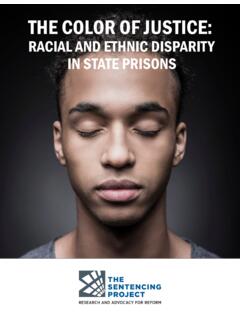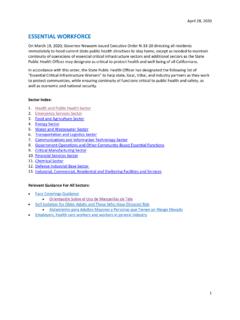Transcription of Drug War in the Philippines - Tom Lantos Human Rights ...
1 House Foreign Affairs Committee Tom Lantos Human Rights Commission Hearing on The Human Rights Consequences of the War on Drugs in the Philippines Thursday, July 20, 2017 - 10:00am 2200 Rayburn House Office Building Statement of Dr. VANDA FELBAB-BROWN Senior Fellow The Brookings Institution I am a Senior Fellow at The Brookings Institution. However, as an independent think tank, the Brookings Institution does not take institutional positions on any issue. Therefore, my testimony represents my personal views and does not reflect the views of Brookings, its other scholars, employees, officers, and/or trustees. President Rodrigo Duterte s war on drugs in the Philippines is morally and legally unjustifiable. Resulting in egregious and large-scale violations of Human Rights , it amounts to state-sanctioned murder.
2 It is also counterproductive for countering the threats and harms that the illegal drug trade and use pose to society -- exacerbating both problems while profoundly shredding the social fabric and rule of law in the Philippines . The United States and the international community must condemn and sanction the government of the Philippines for its conduct of the war on drugs. THE SLAUGHTER SO FAR On September 2, 2016 after a bomb went off in Davao where Duterte had been mayor for 22 years, the Philippine president declared a state of lawlessness 1 in the country. That is indeed what he unleashed in the name of fighting crime and drugs since he became the country s president on June 30, 2016. With his explicit calls for police to kill drug users and dealers2 and the vigilante purges Duterte ordered of neighborhoods,3 almost 9000 people accused of drug 1 Neil Jerome Morales, Philippines Blames IS-linked Abu Sayyaf for Bomb in Duterte's Davao, Reuters, September 2, 2016, 2 Rishi Iyengar, The Killing Time.
3 Inside Philippine President Rodrigo Duterte's War on Drugs, Time, August 24, 2016, 3 Jim Gomez, Philippine President-Elect Urges Public to Kill Drug Dealers, The Associated Press, June 5, 2016, Felbab-Brown 2 dealing or drug use were killed in the Philippines in the first year of his government about one third by police in anti-drug Although portrayed as self-defense shootings, these acknowledged police killings are widely believed to be planned and staged, with security cameras and street lights unplugged, and drugs and guns planted on the victim after the According to the interviews and an unpublished report an intelligence officer shared with Reuters, the police are paid about 10,000 pesos ($200) for each killing of a drug suspect as well as other accused criminals. The monetary awards for each killing are alleged to rise to 20,000 pesos ($400) for a street pusher, 50,000 pesos ($990) for a member of a neighborhood council, one million pesos ($20,000) for distributors, retailers, and wholesalers, and five million ($100,000) for drug lords.
4 Under pressure from higher-up authorities and top officials, local police officers and members of neighborhood councils draw up lists of drug suspects. Lacking any kind transparency, accountability, and vetting, these so-called watch lists end up as de facto hit lists. A Reuters investigation revealed that police officers were killing some 97 percent of drug suspects during police raids,6 an extraordinarily high number and one that many times surpasses accountable police practices. That is hardly surprising, as police officers are not paid any cash rewards for merely arresting suspects. Both police officers and members of neighborhood councils are afraid not to participate in the killing policies, fearing that if they fail to comply they will be put on the kill lists themselves. Similarly, there is widespread suspicion among Human Rights groups and monitors,7 reported in regularly in the international press, that the police back and encourage the other extrajudicial killings -- with police officers paying assassins or posing as vigilante A Reuters interview with a retired Filipino police intelligence officer and another active-duty police commander reported both officers describing in granular detail how under instructions from top-level authorities and local commanders, police units mastermind the No systematic investigations and prosecutions of these murders have taken place, with top police officials suggesting that they are killings among drug dealers Such illegal vigilante justice, with some 1,400 extrajudicial killings.
5 11 was also the hallmark of Duterte s tenure as Davao s mayor, earning him the nickname Duterte Harry. And yet, far from being an exemplar of public safety and crime-free city, Davao remains the murder capital of the 4 Manuel Mogato and Clare Baldwin, Special Report: Police Describe Kill Rewards, Staged Crime Scenes in Duterte s Drug War, Reuters, April 18, 2017, 5 Ibid. 6 Clare Baldwin, Andrew Marshall and Damir Sagolj, Police Rack Up an Almost Perfectly Deadly Record in Philippine Drug War, Reuters, 7 See, for example, Human Rights Watch, Philippines : Police Deceit in Drug War Killings, March 2, 2017, ; and Amnesty International, Philippines : The Police's Murderous War on the Poor, 8 Reuters, April 18, 2017. 9 Ibid. 10 Aurora Almendral, The General Running Duterte s Antidrug War, The New York Times, June 2, 2017.
6 11 Ibid. Felbab-Brown 3 The current police chief of the Philippine National Police Ronald Dela Rosa and President Duterte s principal executor of the war on drugs previously served as the police chief in Davao between 2010 and 2016 when Duterte was the town s mayor. In addition to the killings, mass incarceration of alleged drug users is also under way in the Philippines . The government claims that more than a million users and street-level dealers have voluntarily surrendered to the police. Many do so out of fear of being killed otherwise. However, in interviews with Reuters, a Philippine police commander alleged that the police are given quotas of surrenders, filling them by arresting anyone on trivial violations (such as being shirtless or drunk).13 Once again, the rule of law is fundamentally perverted to serve a deeply misguided and reprehensible state policy.
7 SMART DESIGN OF DRUG POLICIES VERSUS THE Philippines REALITY Smart policies for addressing drug retail markets look very different than the violence and state-sponsored crime President Duterte has thrust upon the Philippines . Rather than state-sanctioned extrajudicial killings and mass incarceration, policing retail markets should have several objectives: The first, and most important, is to make drug retail markets as non-violent as possible. Duterte s policy does just the opposite: in slaughtering people, it is making a drug-distribution market that was initially rather peaceful (certainly compared to Latin America,14 such as in Brazil15) very violent this largely the result of the state actions, extrajudicial killings, and vigilante killings he has ordered. Worse yet, the police and extrajudicial killings hide other murders, as neighbors and neighborhood committees put on the list of drug suspects their rivals and people whose land or property they want to steal; thus, anyone can be killed by anyone and then labeled a pusher.
8 The unaccountable en masse prosecution of anyone accused of drug trade involvement or drug use also serves as a mechanism to squash political pluralism and eliminate political opposition. Those who dare challenge President Duterte and his reprehensible policies are accused of drug trafficking charges and arrested themselves. The most prominent case is that of Senator Leila de Lima. But it includes many other lower-level politicians. Without disclosing credible evidence or convening a fair trial, President Duterte has ordered the arrest of scores of politicians accused of drug-trade links; three such accused mayors have died during police arrests, often with many other individuals dying in the shoot-outs. The latest such incident occurred on July 30, 2017 when Reynaldo Parojinog, mayor of Ozamiz in the southern Philippines , was killed during a police raid on his house, along with Parojinog s wife and at least five other people.
9 12 A Harvest of Lead, The Economist, August 13, 2016, 13 Reuters, April 18, 2017. 14 Vanda Felbab-Brown and Harold Trinkunas, UNGASS 2016 in Comparative Perspective: Improving the Prospects for Success, The Brookings Institution, April 29, 2015, ~/media/Research/Files/Papers/2015/04/gl obal-drug- 15 See, for example, Paula Miraglia, Drugs and Drug Trafficking in Brazil: Trends and Policies, The Brookings Institution, April 29, 2015, ~/media/Research/Files/Papers/2015/04/gl obal-drug- Felbab-Brown 4 Another crucial goal of drug policy should be to enhance public health and limit the spread of diseases linked to drug use. The worst possible policy is to push addicts into the shadows, ostracize them, and increase the chance of overdoses as well as a rapid spread of HIV/AIDS, drug-resistant tuberculosis, and hepatitis.
10 In prisons, users will not get adequate treatment for either their addiction or their communicable disease. That is the reason why other countries that initially adopted similar draconian wars on drugs (such as Thailand in 200116 and Vietnam in the same decade17) eventually tried to backpedal from them, despite the initial popularity of such policies with publics in East Asia. Even though throughout East Asia, tough drug policies toward drug use and the illegal drug trade remain government default policies and often receive widespread support, countries, such as Thailand, Vietnam, and even Myanmar have gradually begun to experiment with or are exploring HARM reduction approaches, such as safe needle exchange programs and methadone maintenance, as the ineffective and counterproductive nature and Human Rights costs of the harsh war on drugs campaign become evident.

